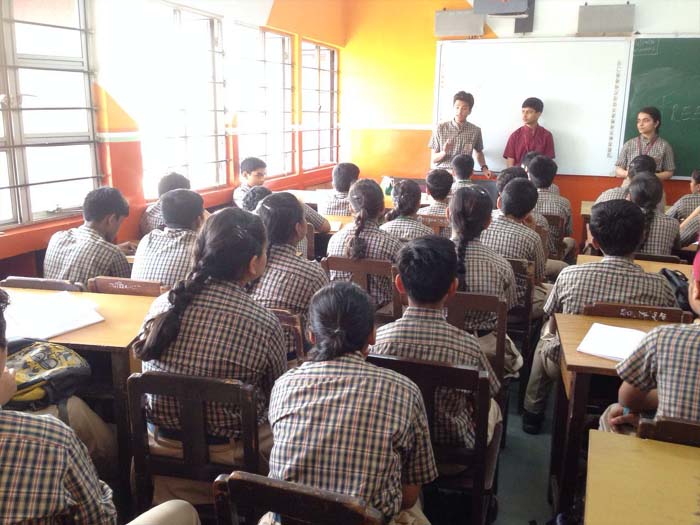Freedom of Expression-an invigorating exchange between classes 9 and 10.
During circle time in zero period, an interactive session was organised for classes IX B, C, D and E on April 4th, 2016. The students interacted with their seniors, Prayansh, Samarth, Arjun, Srishti, Sahil and Himani of class X on the topic Freedom of Expression.
The session started with an introduction of the topic. Students discussed the significance of this fundamental right and how it plays an important role in a democracy such as India. Several points were made.
One observation was that this freedom helps people cast their votes in an informed way, after being educated about the manifestos of the competing political parties, widely, in the media. The class were also oriented about the restrictions to the right. For example, one cannot say anything that can defame a person or generate violence. Here, the recent episode at the Jawaharlal Nehru University was discussed. During this episode, event organisers had pasted posters across the campus inciting students to gather for a protest march against the judicial killing of Afzal Guru and Maqbool Bhat and to come together in solidarity with the struggle of Kashmiri migrants. The event also witnessed several anti- India slogans. This type of freedom of expression is therefore not favourable.
[gallery link="file"]
Pranati Haldia, alumnus of our School, who happened to be present at School that day, was invited to share her views on the topic and other recent events. She told us that the Right to the Freedom of Expression is recognised as a human right under Article 19 of the Universal Declaration of Human Rights and in the International Covenant on Civil and Political Rights (ICCPR). Article 19 of the ICCPR states that Everyone shall have the right to hold opinions without interference. It also states that Everyone shall have the right to freedom of expression. Here she pointed out that Article 19 additionally states that the exercise of these rights carries special duties and responsibilities and may therefore be subject to certain restrictions when necessary. Common limitations on free speech relate to sedition, incitement, fighting words, classified information, copyright violation, trade secrets, non-disclosure agreements, right to privacy, right to be forgotten, political correctness, public security, public order, public nuisance, campaign finance reform, perjury, and oppression.
A few students raised questions which were duly answered by Pranati. To conclude the session, Ms. Veena Awasthi, our subject teacher, discussed how we can make use of this invaluable freedom in our day to day lives even as we always uphold the freedoms and sentiments of others around us.
It was a very enlightening and interesting session and we look forward to many more such discussions on current topics.
Shrey Gogia IX C.













